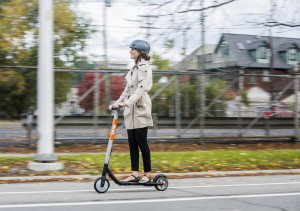
Ford is putting a new spin on its push into mobility services – quite literally, with the acquisition of the San Francisco electric scooter start-up Spin.
The move comes as the auto industry attempts to cope with the explosive growth of alternative transportation businesses, ranging from ride-sharing services Lyft and Uber to the growing availability of bicycle and e-scooter rentals in major cities in the U.S. and abroad.

“Everywhere you look around the U.S., people’s mobility choices are changing,” Sundeep Madra, head of Ford X, the company’s mobility incubator, wrote in a post about the acquisition. “In crowded and congested cities, especially, many are reconsidering their transportation options. From ride-hailing to dedicated bicycle lanes, people and cities are considering alternatives to personal vehicles, but some are also taking more novel approaches — including scooter sharing.”
Separately, Marcy Klevorn, the president of Ford’s mobility unit, told the Reuters news service that the Spin acquisition “fills a gap in our mobility portfolio.”
(GM going to build eBikes and wants public to name them. Click Here for the story.)

Ford has been an aggressive player in seeking out new mobility options, among other things investing heavily in autonomous driving technology. Sources say those efforts could be one of the topics being discussed between the Detroit automaker and Volkswagen as they explore a range of possible joint ventures.
The push has the strong backing of Ford CEO Jim Hackett who oversaw much of its mobility efforts as a board member prior to taking over as chief executive in May 2017 following a management shake-up.
Spin is one of several companies trying to create a business model based on the idea of seeding a major metropolitan community with electrified scooters that people can access using a smartphone app and then drop off when they reach their destination. The concept is finding wide use in the Bay area, where Spin is based, as well as a number of other cities. But it has also generated frustration in some markets, critics complaining that users frequently just drop off the scooters in the middle of sidewalks, causing a potential safety hazard.
Ford’s Madra appeared to be hinting at efforts to resolve such concerns, noting in his blog post that, Spin is committed to working hand-in-hand with cities and universities to implement micro-mobility solutions responsibly, safely and sustainably as they expand their operations.”
(Click Here for more about Uber getting into the eBike business.)

The e-scooters are believed to cost anywhere from $100 to $300 apiece and are supplied by Chinese companies such as Ninebot. They are rented out for a $1 fee plus 15 cents for each minute of use.
Unlike most bicycle sharing services, there are no docking stations where the e-scooters are picked up and dropped off. So, companies like Spin have to pay contractors to gather up the scooters during the day to charge and redistribute them.
The Ford acquisition comes at a fairly low price compared to the money invested so far in Spin’s two key competitors, Lime and Bird. Based in San Mateo, California, Lime is currently valued at $4 billion and has generated $450 million in funding. Bird is valued at $2 billion and has drawn $400 million in investments.
Spin has a smaller presence than those two key rivals, currently operating in 32 cities. Under Ford, it plans to grow that to 100 markets during the next 18 months.
(To see more about the deal between Ford’s Autonomic and China’s Alibaba, Click Here.)
While Ford has put its money into an e-scooter company, crosstown rival General Motors this past week announced plans to enter an alternative mobility arena. It will start selling electric bicycles, though it has not offered details about the venture, including whether it might make them available through a bike-sharing service or just go with a retail operation.







